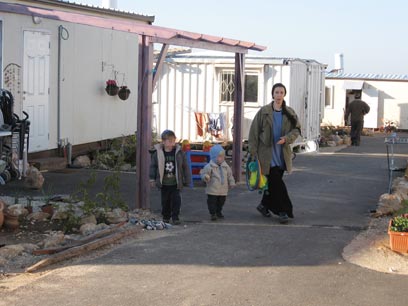
'End the caravan nightmare'
As State commission of inquiry into the treatment of Gush Katif evacuees readies to submit its final report, former Gaza settlement residents hope it will bring their plight to its end
The State commission of inquiry into the treatment of Gush Katif evacuees will publish its final report Tuesday, after a year's worth of work.
The committee, headed by retired Supreme Court Justice Eliahu Mazza has held dozens of meeting and questioned numerous people, including former Prime Minister Ehud Olmert, various ministers, company heads, executives of the Tnufa Administration – previously called Sela, the body formed to see Gaza settlers through the disengagement – and evacuees.
The committee's interim report, submitted in September 2009, found that State authorities were responsible for the delays in rehabilitating settlers, but did not exempt the settlers themselves from being responsible for some of their difficulties.
Despite the change in government, the State's investment in the evacuees' welfare has remained minimal, and many of them still reside in the caravans they were allotted some five years ago.
One part of the repot focuses on the former residents of the Netzarim settlement, who were relocated to Ariel. The community has often been called "the pullout's greatest casualties" – 100 families were housed in Ariel University Center's student dormitory, but two months later the majority moved south, forming the Yevul community near the Israel-Egypt border.
It took the Amana Settlement Movement and the City of Ariel nearly seven months to move the remaining families to temporary housing, they told Ynet.
The evacuees began buying land in Ariel, in hopes of rebuilding their homes. "From the first day of the expulsion, we assumed responsibility for carrying on," Itzik Vsaneh, a resident of the caravan community said. "We understood that this was going to be a complicated situation and that the government had no real intention to help us."

Netzarim evacuees in Ariel (Archives)
Vsaneh said that the evacuees asked the Tnufa Administration for assistance "but they just kept dragging their feet, and just like the government – left us with no help to speak of."
The real "slap in the face," as some put it, came with the government decision to freeze all settlement expansion.
"We paid for this land and all of a sudden the state drives us out and tells us that we are not allowed to build on it," Ayelet Cohen-Zada told Ynet.
"We refused to believe it at first, but soon life just began looking like life in a transit camp." Cohen-Zada, a mother of eight, lost her sister and thee nephews in a terror attack in the Itamar settlement, and lost her husband shortly before the Gaza pullout.
"We don't want anything from the state. All we want is to be allowed to build our homes… This nightmare has been going on for more than four-and-a-half years."
Cohen-Zada and other evacuees, told Ynet that the caravans are extremely run down, adding that they have been left to their own devices in maintaining them.
The government, said Vsaneh, "Doesn’t understand what it costs to upkeep and live within a caravan shell." He said he has to rent a container from Zim Shipping, in order to make room for his eight children.
Given the fact that caravans have no insulation, "We're freezing in winter and suffer from the heat in summer. Our power bills are enormous."
Vsaneh said he hoped the committee's report will also address the low restitution paid to Gush Katif evacuees. "When we finally start building our homes, it would be under different cost of living expenditures, compared to when we got (restitution).
"We all hope that the report will include a timeframe for all the bodies involved to follow, so our suffering can end," he concluded. "Someone has to right this wrong."










